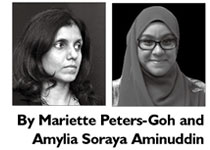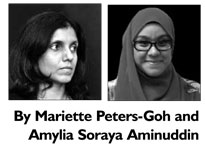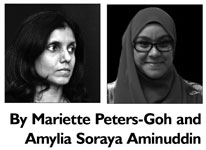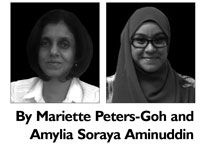The Malaysian Federal Court in the case of Majlis Agama Islam Wilayah Persekutuan v Victoria Jayaseele Martin [2016] 1 LNS 131, issued a landmark ruling whereby it held that only Muslims may practise as Syarie lawyers in the Syariah Courts in Wilayah Persekutuan, Kuala Lumpur, Malaysia.
The facts
The applicant, Victoria Jayaseele Martin, is an Advocate and Solicitor of the High Court of Malaya. After obtaining the Diploma in Syariah Law and Practice from the International Islamic University, Malaysia, she applied in 2009 to be admitted as a Syarie lawyer in Wilayah Persekutuan, Kuala Lumpur, Malaysia. Her application was however denied on the ground that she is not a Muslim, a condition imposed by Rule 10 of the Syariah Lawyers Rules 1993, or commonly known as the Peguam Syarie Rules 1993 (the Rules).
The arguments
Ms Martin argued that based on section 59(1) of the Administration of Islamic Law (Federal Territories) Act 1993 (Act 505), the Federal Territories Islamic Religious Council or Majlis Agama Islam Wilayah Persekutuan (MAIWP) may admit any person who has sufficient knowledge on Islamic law to practise in the Syariah Courts as a Syarie lawyer. Furthermore, she argued that the parliamentary debate of August 1995 had clearly made provisions for “non-Muslims who have adequate knowledge of Syariah laws” to practise in Syariah courts. It was also articulated that the MAIWP had contravened the Federal Constitution in rejecting her application. She had asked the court for a declaration that Rule 10 of the Rules, which only allows Muslims to be accepted as Syarie lawyers in the Federal Territory, is unconstitutional as it violates specific provisions of the Federal Constitution, namely, Article 5 on the right to life and liberty, Article 8 on the right to equality and Article 10 on the freedom of speech, assembly and association.
Section 59. Peguam Syarie
(1) Subject to subsection (2), the Majlis may admit any person having sufficient knowledge of Islamic Law to be Peguam Syarie to represent parties in any proceedings before the Syariah court.
(2) The Majlis may, with the approval of the Yang di-Pertuan Agong, make rules –
(a) to provide for the procedure, qualifications and fees for the admission of Peguam Syarie; and
(b) to regulate, control and supervise the conduct of Peguam Syarie.
The decision
The High Court, in 2011, held that since the Syariah laws fall within the jurisdiction of the State, the Federal Constitution empowers the MAIWP, under section 59(2) of Act 505, to legislate on the qualification of a Syarie lawyer. The power to legislate based on the empowering provision and the broad meaning of the word ‘qualifications’ allow the MAIWP to impose a condition that only a Muslim may be admitted as a Syarie lawyer. The condition for a Syarie lawyer to be a Muslim imposed by the MAIWP, was held to be based on the requirements of Syariah and Islamic jurisprudence. It was also held that if the legislature deems that condition necessary that for the purpose of achieving the object of Act 505, then Rule 10 of the Rules is good law and does not violate Article 8 of the Federal Constitution.
It was further held that Rule 10 is not unconstitutional and did not contravene Articles 5 and 10 of the Federal Constitution, as the applicant was not deprived of practising as an Advocate & Solicitor in the Civil Court, and that Ms Martin could not force her application as a member to be allowed.
Ms Martin appealed and in 2013, the Court of Appeal reversed the ruling of the High Court and held that non-Muslims were eligible to practise in the Syariah courts on the basis that the words ‘any person’ in section 59 of Act 505, do not confine Syariah law practitioners to Muslims only, and therefore, the Rules, which allow only Muslims to be admitted as Syarie lawyers, were ultra vires Act 505.
On March 24, 2016, in reinstating the decision of the High Court, the Federal Court, decided that only Muslim lawyers are eligible to practise as Syarie lawyers in the Federal Territory. Rule 10 of the Rules did not contravene Articles 5, 8 and 10 of the Federal Constitution, and did not go beyond the powers granted by Act 505. According to the Federal Court, having a Syariah lawyer who professed the religion of Islam was important to achieve the objectives of Act 505.
––––––––
D3-3-8 Solaris Dutamas, No 1 Jalan Dutamas 1, 50480 Kuala Lumpur, Malaysia
Tel: (60) 3 6209 8228 / Fax: (60) 3 6209 8221
E: look@zulrafique.com.my
W: www.zulrafique.com.my














 Zul Rafique & Partners
Zul Rafique & Partners Dato’ Zulkifly Rafique
Dato’ Zulkifly Rafique







